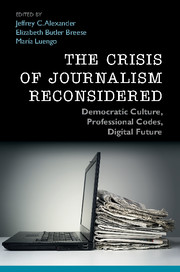Book contents
- Frontmatter
- Dedication
- Contents
- About the Contributors
- Preface
- Acknowledgments
- Introduction: Journalism, democratic culture, and creative reconstruction
- PART I THE CRISIS NARRATIVE
- PART II FEARS OF DIGITAL NEWS MEDIA: THE SYMBOLIC STRUGGLE
- PART III PROFESSIONAL JOURNALISM, CIVIL CODES, AND DIGITAL CULTURE
- 11 Journalism in American regional online news systems
- 12 Digital media and the diversification of professionalism: A US–German comparison of journalism cultures
- 13 Professional and citizen journalism: Tensions and complements
- 14 Expressions of right and wrong: The emergence of a cultural structure of journalism
- Conclusion: News innovations and enduring commitments
- Index
- References
11 - Journalism in American regional online news systems
from PART III - PROFESSIONAL JOURNALISM, CIVIL CODES, AND DIGITAL CULTURE
Published online by Cambridge University Press: 05 June 2016
- Frontmatter
- Dedication
- Contents
- About the Contributors
- Preface
- Acknowledgments
- Introduction: Journalism, democratic culture, and creative reconstruction
- PART I THE CRISIS NARRATIVE
- PART II FEARS OF DIGITAL NEWS MEDIA: THE SYMBOLIC STRUGGLE
- PART III PROFESSIONAL JOURNALISM, CIVIL CODES, AND DIGITAL CULTURE
- 11 Journalism in American regional online news systems
- 12 Digital media and the diversification of professionalism: A US–German comparison of journalism cultures
- 13 Professional and citizen journalism: Tensions and complements
- 14 Expressions of right and wrong: The emergence of a cultural structure of journalism
- Conclusion: News innovations and enduring commitments
- Index
- References
Summary
Many studies have documented the travails of local journalism in the United States (e.g. Anderson, et al. 2012; Downie and Schudson 2009 Knight Commission 2010; Waldman 2011). The daily newspapers that employ the bulk of local journalists have seen their revenues drop every quarter since 2006. Declining revenues have translated into shrinking news staffs – in the same period, over 25 percent of journalists working for daily newspapers have been laid off or bought out. In many regions around the country, tens if not hundreds of online only news sites – many managed by nonjournalists – have emerged around these diminished newspapers (e.g. Caggiano 2011; Gordon and Syndio Social 2010; Ryfe et al. 2012). These trends have left many observers wondering if local and regional journalism has a future in the United States (e.g. Ryfe 2012).
The research I present below on the online news systems emerging in two regions of the west coast shows that journalism – at least its culture if not its organizational structures – may prove to be more resilient in the digital world than one might suppose. My data come from interviews with eighteen individuals representing fifteen news sites in these two regions. I find that the individuals who have founded start-up news sites are principally motivated to “cover their communities,” which to them means producing news as conventionally understood: fact-based stories about discrete public events in their neighborhoods. As they see it, regional mainstream media no longer produce such coverage. Therefore, they interpret the opportunity before them as filling this gap.
In attempting to fill this gap, however, they encounter a dilemma, namely, that of gaining visibility in their communities. One part of this problem – the difficulty of gaining attention in the cacophony of the Web – is well known. But the people with whom I have talked describe the dilemma in multiple ways. It involves gaining attention, but also becoming recognizable to others as journalists. This difficulty is most pronounced for entrepreneurs with limited news backgrounds. For these individuals, convincing sources to talk with them, local businesses to trust them, and audiences to read the content they produce is difficult.
- Type
- Chapter
- Information
- The Crisis of Journalism ReconsideredDemocratic Culture, Professional Codes, Digital Future, pp. 211 - 227Publisher: Cambridge University PressPrint publication year: 2016
References
- 4
- Cited by

